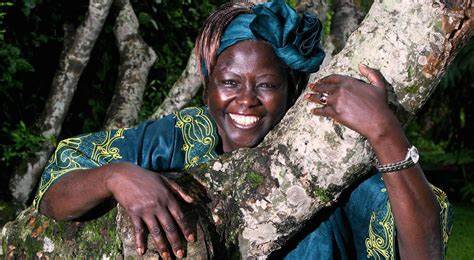Wangari Maathai (April 1, 1940 – September 25, 2011) was a prominent Kenyan environmentalist, political activist, and Nobel Peace Prize laureate. Her life was marked by dedication to environmental conservation, women’s rights, and social change. Born in Nyeri County, Kenya, she pursued education where she received scholarships for higher education. She earned a Bachelor of Science degree in Biology from Mount St. Scholastica College in the United States of America and later completed her master’s degree in biology at the University of Pittsburgh. She earned her PHD from the University of Nairobi.
Maathai’s environmental activism began in the 1970s when she became concerned about the rapid deforestation and environmental degradation in Kenya. In her eyes, environmental conservation was equal to human well-being. To help with her noble course, Maathai founded the Green Belt Movement whose primary focus was on tree planting, soil conservation and empowering women in rural areas to take part in environmental conservation efforts.
Maathai was also an active Politician, serving as a Member of Parliament from 2002 to 2007 and held the position of Assistant Minister for Environment and Natural Resources in Kenya. In 2004, she became the first African Woman to receive the prestigious Nobel Peace Prize, in honor of her outstanding contributions to sustainable development, democracy, and peace through her environmental and social work. Her social work was characterized by advocating for women’s rights. Empowering women was essential to achieving sustainable development and social progress. Maathai authored several books, including her memoir “Unbowed,” which detailed her life and activism and “The Challenge for Africa,” in which she discussed the African continent’s development challenges.
In 1989 Wangari Maathai filed a petition to the High Court against a plan to build Kenya Times Trust Complex which would host Kanu Headquarters on Uhuru Park land. While her petition was struck out for lack of locus standi to defend Uhuru Park as public utility, it gave birth to the clamor for expanding rights of citizens to defend public interest. These provisions are found in the Constitution of Kenya 2010. Article 42 affirms the right to a clean and healthy environment, emphasizing the duty of the state to safeguard it for present and future generations. This mirrors Wangari Maathai’s lifelong commitment to environmental conservation and tree planting. Article 69 outlines the state’s responsibility to ensure sustainable environmental management and protection, echoing Maathai’s efforts to maintain tree cover and protect biodiversity. Additionally, Article 70 grants individuals the right to seek legal redress when their environmental rights are threatened or violated, reinforcing Maathai’s advocacy for environmental protection and offering a legal avenue for addressing harm to the environment. Wangari Maathai will forever be remembered for her dedication to protection of the environment as our heritage.


